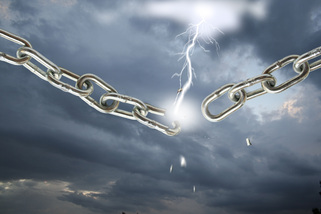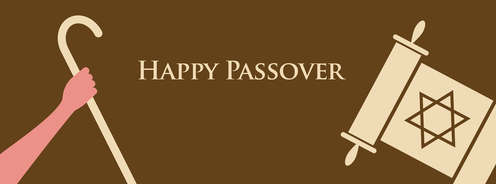WHEN
WILL REDEMPTION COME?
Perhaps one of the reasons religion has such a hold on so many people throughout the world is because of its promise of redemption. Redemption can come in many forms. Some believe it happens after death, others only when the Messiah comes and still others believe redemption can happen during our lives.
Perhaps one of the reasons religion has such a hold on so many people throughout the world is because of its promise of redemption. Redemption can come in many forms. Some believe it happens after death, others only when the Messiah comes and still others believe redemption can happen during our lives.
Redemption is, of course, a theme which permeates Jewish theology and we feel it perhaps most strongly during Pesach. After all, it is God who redeems the Jewish people from slavery. It is God who leads us through the wilderness. But, even with the will and force of God guiding us from slavery to freedom, it is abundantly clear that we, too, as the mere humans we are, play a pivotal role in our own redemption.
We often ask the question during religious services, “When will redemption come?” We respond with prayerful hope—Redemption will come when there are no more starving people in the world, when good will triumph over evil, when warring will end and all the peoples of the world can know peace, when slavery shall be a thing of the past and all will know freedom. No wonder Passover is the most observed and popular of the Jewish holidays among Jews but it is also celebrated by many non-Jews as well and that’s because its message is both universal and contemporary.
We often ask the question during religious services, “When will redemption come?” We respond with prayerful hope—Redemption will come when there are no more starving people in the world, when good will triumph over evil, when warring will end and all the peoples of the world can know peace, when slavery shall be a thing of the past and all will know freedom. No wonder Passover is the most observed and popular of the Jewish holidays among Jews but it is also celebrated by many non-Jews as well and that’s because its message is both universal and contemporary.
|
But, here’s the rub about freedom. While each of us may yearn for the move from enslavement to freedom, actually experiencing liberty is as much an internal phenomenon as an external one. Egypt is about physical bondage. Passover’s message goes deeper than that because while one may be physically free, there is much that can still enslave us. Redemption from slavery has never been confined to those held in captivity only. Many of us may live our lives in quiet desperation trapped in our own personal, seemingly endless Egypt’s. After all, the Egypt of our heritage is a dead end, an abyss offering no way out and yet, somehow we willed ourselves to leave everything that was familiar for something very much unknown. Very often it is only during times of crisis that we perceive the opportunity for a way out however narrow the straits of possibility may seem. Sometimes, people need to hit rock bottom before they see a way out. It often takes a crisis, indeed, affording us the means to see the faint glimmer of a light at the end of a long, dark tunnel.
|
|
Passover comes along every year bolstering us when that way out seems impossible. Passover reminds us that deliverance from our many enslavements is possible, those which are externally imposed upon us and those which we carry internally within us wherever we go. The story of the Exodus is found in many chapters of history imprinted in each of our memories whether we remember it as a deliverance from Biblical Egypt or from the American South. Regardless of the particular exodus, we believe the world needs to be on a path pursuing and insisting upon freedom whether it is demonstrated in a march in Selma or in the courts advocating for same sex marriage.
|
There is no precise formula for resisting the shackles of enslavement; there is only the recognition that the peak of enslavement is, in fact, the beginning of redemption. Just before the miracle of the Exodus, the Torah says that the Egyptians made the Israelites’ lives bitter [Exodus 1:14]. Bitterness can lead to resignation but it can also lead to a break, a shattering of finally rejecting resignation and compliance. The Bible records the moment it happened: The Israelites cried out and God heard their cries [Exodus 2:23]. Rabbi Adin Steinsaltz reminds us that one must want to be redeemed in order to be redeemed. And out of the depths of their suffering a new reality was born enabling the Israelites to reject Egypt and move forward with a nascent faith in the promise of redemption by God.
So as we sit around our Seder tables this Passover, as we sing, discuss how others still are enslaved and oppressed and express our profound gratitude to God for redeeming us, so may we also understand that redemption will come when we are willing to take an active role as God’s partners to make it happen.
So as we sit around our Seder tables this Passover, as we sing, discuss how others still are enslaved and oppressed and express our profound gratitude to God for redeeming us, so may we also understand that redemption will come when we are willing to take an active role as God’s partners to make it happen.





